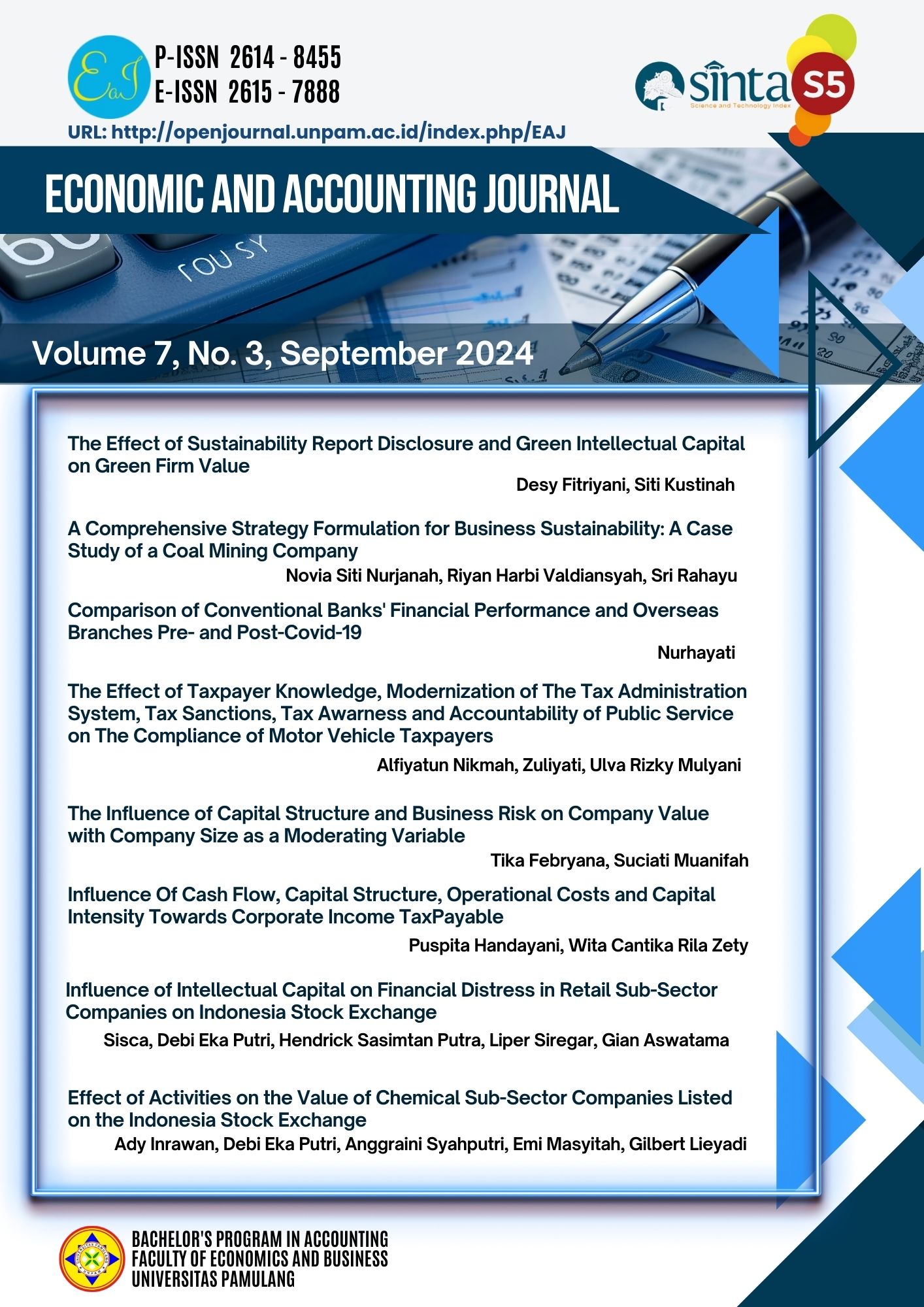Influence of Intellectual Capital on Financial Distress in Retail Sub-Sector Companies on Indonesia Stock Exchange
DOI:
https://doi.org/10.32493/eaj.v7i3.y2024.p253-260Keywords:
Intellectual Capital, Financial DistressAbstract
The purpose of this study is to examine: 1. The overview of intellectual capital and financial distress in retail sub-sector companies listed on the Indonesia Stock Exchange. 2. The influence of intellectual capital on financial distress in retail sub-sector companies listed on the Indonesia Stock Exchange. This study employs a library research design and uses data from all retail sub-sector companies on the Indonesia Stock Exchange on December 31, 2022. The study applies qualitative and quantitative descriptive analysis with purposive sampling techniques. Methods used for data analysis and testing include hypothesis testing, correlation and determination coefficients, simple linear regression analysis, and classical assumption tests. The study draws two main conclusions: 1. Intellectual capital and financial distress fluctuate and tend to decline over time. 2. According to the simple linear regression analysis, intellectual capital has a positive but insignificant effect on financial distress. The coefficient of determination test results indicate that intellectual capital contributes only a small portion to financial distress. The correlation coefficient test results show a very weak relationship between intellectual capital and financial distress.
References
Darmadi. (2020). Pengaruh intellectual capital dan leverage terhadap financial distress pada Indomaret Cabang Kelapa Dua Gading Serpong Kabupaten Tangerang. Jurnal Ekonomi dan Bisnis, 3(1), 240–247.
Ardalan, B., & Askarian, H. (2014). The impact of intellectual capital on the risk of financial distress of listed companies in Tehran Stock Exchange, Iran. Indian Journal of Fundamental and Applied Life Sciences, 4(1), 840–853.
Ilham, R. N., Putri, D. E., Putra, H. S., Sari, E. P., & Siallagan, S. (2022). Pengaruh Good Corporate Governance Terhadap Kualitas Laba Perusahaan Sub Sektor Pertambangan Logam dan Mineral. Jurnal Ilmu Manajemen, 11(2), 129-138.
Ismainar, H. (2015). Manajemen unit kerja: Untuk perekam medis dan informatika kesehatan ilmu kesehatan masyarakat keperawatan dan kebidanan. Yogyakarta: Deepublish.
Kasmir. (2018). Analisis laporan keuangan (11th ed.). Depok: Rajawali Pers.
Musthafa, H. (2017). Manajemen keuangan (P. Christian, Ed.). Yogyakarta: ANDI.
Pulungan, K. P. A., et al. (2017). Pengaruh likuiditas dan leverage terhadap financial distress pada perusahaan sub sektor keramik porselen dan kaca yang terdaftar di Bursa Efek Indonesia. Jurnal Ekonomi dan Bisnis, 3(2), 1–9.
Purba, S. I. M. (2019). Pengaruh kepemilikan institusional, intellectual capital, dan leverage terhadap financial distress. JAF - Journal of Accounting and Finance, 2(2), 27.
Rohmadini, A., Saifi, M., & Darmawan, A. (2018). Pengaruh profitabilitas, likuiditas, dan leverage terhadap financial distress (Studi pada perusahaan food & beverage yang terdaftar di Bursa Efek Indonesia periode 2013-2016). Jurnal Administrasi Bisnis, 61(2), 11–19.
Sari, E. P., Ilham, R. N., Putri, D. E., & Syahputri, A. (2022). Kebijakan dividen sebagai pemediasi pengaruh antara leverage dan profitabilitas terhadap nilai perusahaan pada perusahaan indeks Lq 45. Jurnal Akuntansi dan Pajak, 22(2), 676-686.
Silalahi, E. M. (2021). Buku referensi intellectual capital improve your employee productivity and performance. Yogyakarta: CV Budi Utama.
Sudana, I. M. (2015). Manajemen keuangan perusahaan: Teori dan praktik (2nd ed.). Jakarta: Erlangga.
Wati, Y., Saragih, F. M., Yusrizal, Y., Welly, Y., & Putri, D. E. (2023). Corporate Social Responsibility, Corporate Governance, Firm Size and Financial Performance of Companies in Indonesia. Jurnal Ecogen, 6(2), 177-191.
Additional Files
Published
Issue
Section
License
Copyright (c) 2024 Sisca, Debi Eka Putri, Hendrick Sasimtan Putra, Liper Siregar, Gian Aswatama

This work is licensed under a Creative Commons Attribution-NonCommercial-ShareAlike 4.0 International License.
Authors who publish with this journal agree to the following terms:
- Authors retain copyright and grant the journal right of first publication with the work simultaneously licensed under a Creative Commons Attribution License that allows others to share the work with an acknowledgement of the work's authorship and initial publication in this journal.
- Authors are able to enter into separate, additional contractual arrangements for the non-exclusive distribution of the journal's published version of the work (e.g., post it to an institutional repository or publish it in a book), with an acknowledgement of its initial publication in this journal.
- Authors are permitted and encouraged to post their work online (e.g., in institutional repositories or on their website) prior to and during the submission process, as it can lead to productive exchanges, as well as earlier and greater citation of published work (See The Effect of Open Access).

This work is licensed under a Creative Commons Attribution-ShareAlike 4.0 International License.


